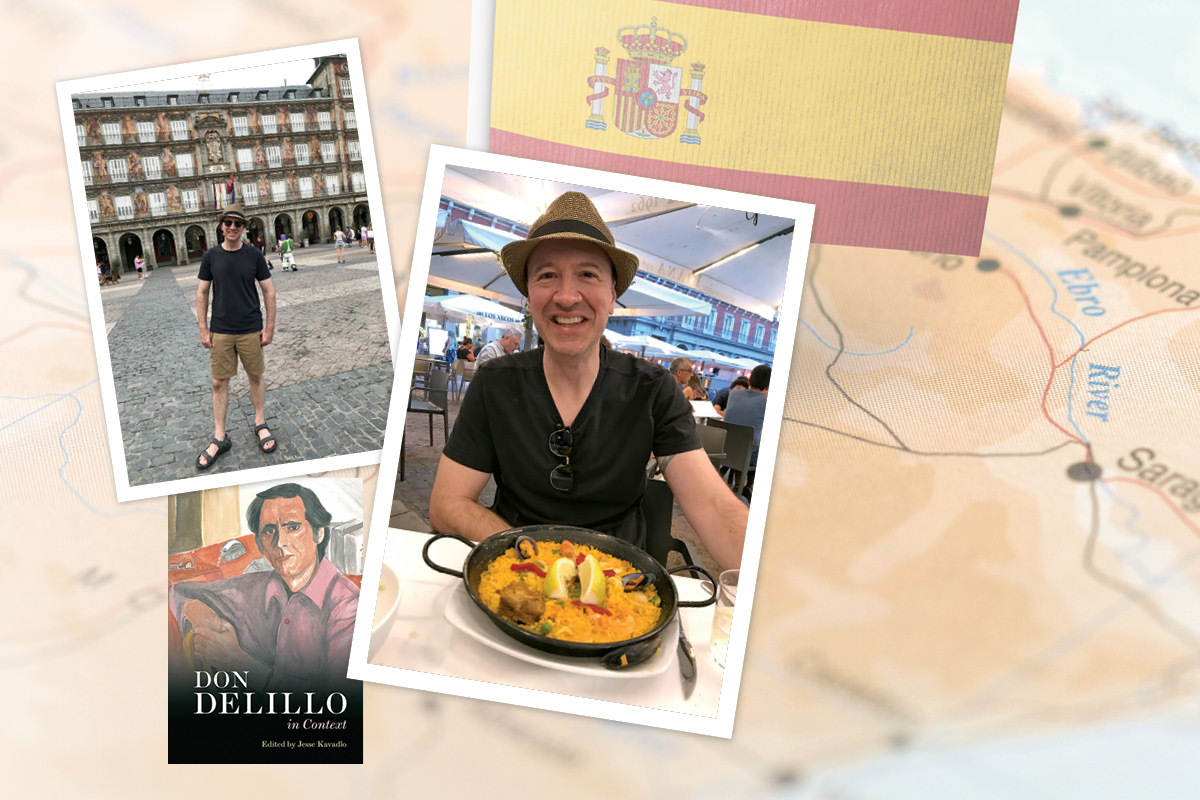Professor Jesse Kavadlo, a world-renowned scholar of American novelist Don DeLillo, shares DeLillo’s works with Maryville students and recently published a book about the author with the prestigious Cambridge University Press.
Jesse Kavadlo, PhD, tells his literature students at Maryville that Don DeLillo may be the most famous writer they’ve never heard of. With his second book about DeLillo coming out, Kavadlo is doing his part to correct that notion.
Kavadlo, professor of English and humanities, has taught at Maryville since 2004. He teaches all levels of American literature and is beloved for his popular culture courses about monsters, superheroes, conspiracies, and rock and roll, among other topics.
But Kavadlo is also a longtime student of DeLillo. His PhD thesis at Fordham University was published as a book, titled Don DeLillo: Balance at the Edge of Belief. Now, he has edited a second book, Don DeLillo In Context, published by Cambridge University Press. Kavadlo said he hadn’t planned to do a second DeLillo book, but he was drawn in anyway. “As he kept publishing and he kept writing,” Kavadlo said, “I found that I had more to say.”
That fascination began with Kavadlo’s first experience with the DeLillo canon, the novel White Noise, which won the National Book Award in 1985. It is about an academic year in a small American college town that is struck by a toxic environmental event. “I felt like it was speaking to me,” he said. “It has a sense of humor, a sense of existential dread, along with a satire of higher education.”
After all these years, Kavadlo said that book is still his favorite; he’s read it about a dozen times and teaches it regularly — not always to rave reviews from his students. “The class is always a little bit mixed on it,” he said. “I think it’s an important one for them to read. But it’s also a really good exercise for them to see how all these sentences work and how DeLillo really pulls it off. The voice is very powerful and well written.”
Besides experiencing DeLillo with his Maryville students, Kavadlo is recognized internationally for his knowledge of the author. He recently traveled to Spain to take part in the defense of a PhD thesis by a student there. The defense was hosted by the University of Alcalá, located outside of Madrid. Looking at DeLillo from a different point of view was a fascinating and instructive experience, Kavadlo said, and something that will benefit his future teachings of the author’s work. “The way this student approached it was different from the way Americans do,” he explained. “She focused on his Americanness, with an interesting outside perspective, about reading it in English then looking at Spanish translations, and about how some ways the translations are complicated because of how he is interested in language and ambiguity.”
As president of the Don DeLillo Society, Kavadlo has kept up with the author, who continues to publish novels but whose prose has become more concentrated. “As he’s getting older, since the novel Underworld, he’s gotten very stripped down and more cryptic in his writing,” Kavadlo said, “and the humor has gotten ice cold. It’s a little tricky. He’s being more ascetic in his writing, and that takes more from the reader. I find myself reading him and giving him the benefit of the doubt over time.”
Not that DeLillo is detached from modern American tastes. Kavadlo said he can find DeLillo influences in such disparate popular culture fare as Lost and Mad Men, as well as in a new film adaptation of White Noise.
Though the term “postmodern” has been used many times to describe the DeLillo canon, the author himself distances himself from the label, saying he considers himself part of a long line of modernists, from Joyce through Faulkner and so on. Kavadlo has a broader view. “Sometimes it can be helpful to try to understand DeLillo in terms of a genre,” he said, “even though with some of his earlier novels, he played around with them. But they’re postmodern in that he was aware of those genres. He’s quite different from some of the other writers who are in those categories.
“A word used a lot with DeLillo is ‘prescient.’ He was ahead of his time, but at same time, very historical-thinking and backwards-looking at the Cold War and the Kennedy assassination.” Kavadlo feels DeLillo’s readership is likely to grow, in terms of popularity and appreciation. “I definitely think he’s going to continue to be read in the far future,” he said. “The worst case is that he’s studied as a historical figure. I hope it’s not just that. I hope people read him because he gives us a very interesting window into the way things were and continue to be.”
In terms of his own publication, Kavadlo, who also directs Maryville’s Dr. Mary Ellen Finch Center for Teaching and Learning, emphasized how significant it is for a member of the University’s faculty to have a book published by the prestigious Cambridge University Press. “Publishing a book like this with Cambridge is a big deal for me,” he said. “Maryville’s faculty does significant research in their disciplines and fields. This is an important part of our faculty identity as well as our student-centered learning.”
